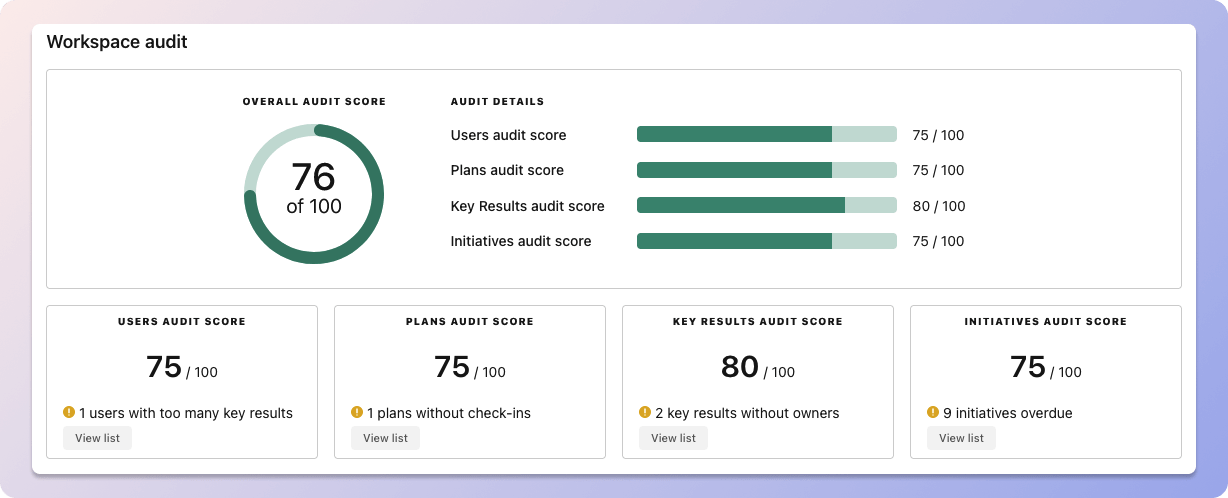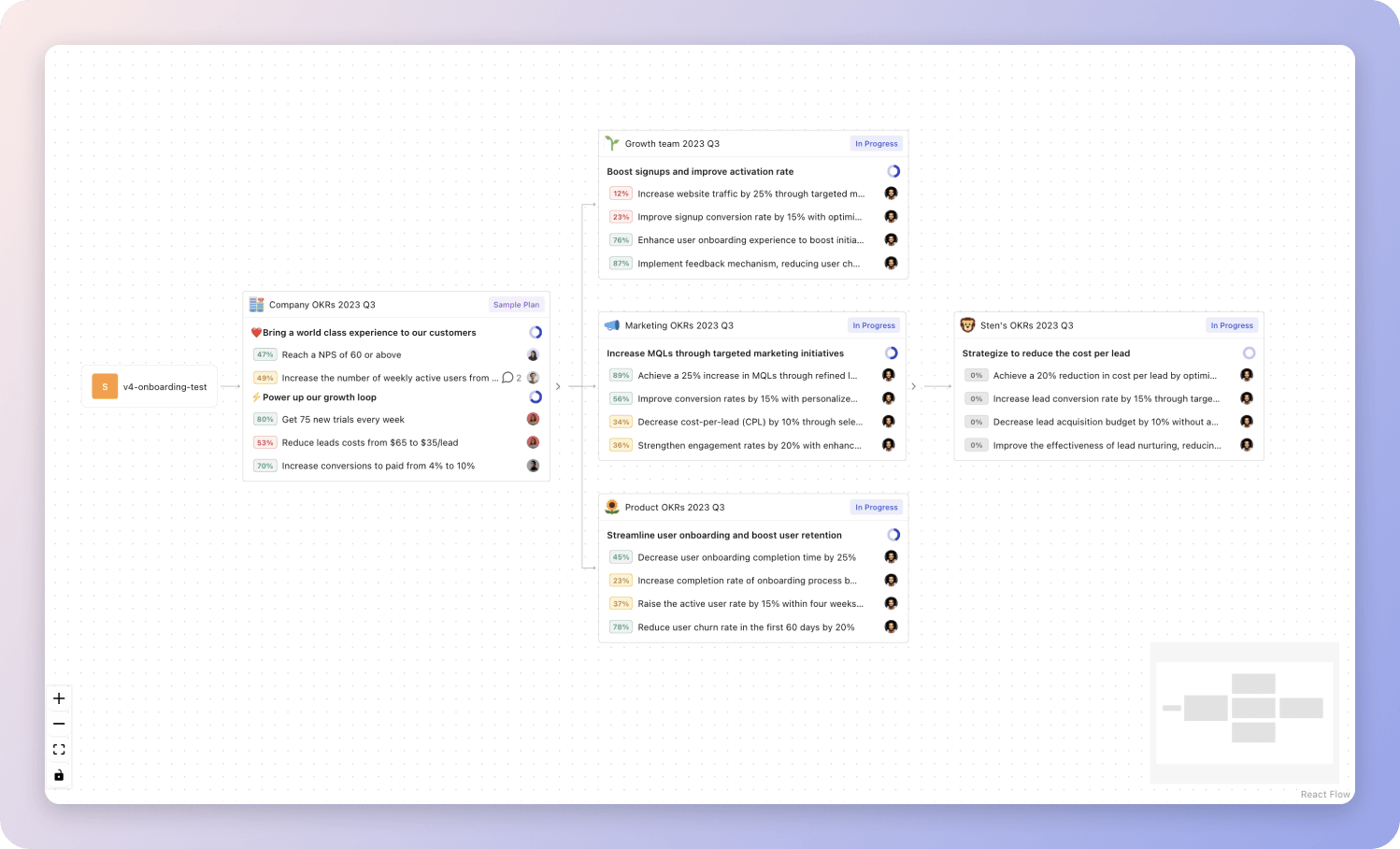5 OKR examples for Feedback Coordinator
What are Feedback Coordinator OKRs?
The Objective and Key Results (OKR) framework is a simple goal-setting methodology that was introduced at Intel by Andy Grove in the 70s. It became popular after John Doerr introduced it to Google in the 90s, and it's now used by teams of all sizes to set and track ambitious goals at scale.
Formulating strong OKRs can be a complex endeavor, particularly for first-timers. Prioritizing outcomes over projects is crucial when developing your plans.
We've tailored a list of OKRs examples for Feedback Coordinator to help you. You can look at any of the templates below to get some inspiration for your own goals.
If you want to learn more about the framework, you can read more about the OKR meaning online.
Best practices for managing your Feedback Coordinator OKRs
Generally speaking, your objectives should be ambitious yet achievable, and your key results should be measurable and time-bound (using the SMART framework can be helpful). It is also recommended to list strategic initiatives under your key results, as it'll help you avoid the common mistake of listing projects in your KRs.
Here are a couple of best practices extracted from our OKR implementation guide 👇
Tip #1: Limit the number of key results
Having too many OKRs is the #1 mistake that teams make when adopting the framework. The problem with tracking too many competing goals is that it will be hard for your team to know what really matters.
We recommend having 3-4 objectives, and 3-4 key results per objective. A platform like Tability can run audits on your data to help you identify the plans that have too many goals.
 Tability's audit dashboard will highlight opportunities to improve OKRs
Tability's audit dashboard will highlight opportunities to improve OKRsTip #2: Commit to the weekly check-ins
Setting good goals can be challenging, but without regular check-ins, your team will struggle to make progress. We recommend that you track your OKRs weekly to get the full benefits from the framework.
Being able to see trends for your key results will also keep yourself honest.
 Tability's check-ins will save you hours and increase transparency
Tability's check-ins will save you hours and increase transparencyTip #3: No more than 2 yellow statuses in a row
Yes, this is another tip for goal-tracking instead of goal-setting (but you'll get plenty of OKR examples below). But, once you have your goals defined, it will be your ability to keep the right sense of urgency that will make the difference.
As a rule of thumb, it's best to avoid having more than 2 yellow/at risk statuses in a row.
Make a call on the 3rd update. You should be either back on track, or off track. This sounds harsh but it's the best way to signal risks early enough to fix things.
Building your own Feedback Coordinator OKRs with AI
While we have some examples below, it's likely that you'll have specific scenarios that aren't covered here. There are 2 options available to you.
- Use our free OKRs generator
- Use Tability, a complete platform to set and track OKRs and initiatives
- including a GPT-4 powered goal generator
Best way to track your Feedback Coordinator OKRs
Quarterly OKRs should have weekly updates to get all the benefits from the framework. Reviewing progress periodically has several advantages:
- It brings the goals back to the top of the mind
- It will highlight poorly set OKRs
- It will surface execution risks
- It improves transparency and accountability
Most teams should start with a spreadsheet if they're using OKRs for the first time. Then, once you get comfortable you can graduate to a proper OKRs-tracking tool.
 Tability's Strategy Map makes it easy to see all your org's OKRs
Tability's Strategy Map makes it easy to see all your org's OKRsIf you're not yet set on a tool, you can check out the 5 best OKR tracking templates guide to find the best way to monitor progress during the quarter.
Feedback Coordinator OKRs templates
We've covered most of the things that you need to know about setting good OKRs and tracking them effectively. It's now time to give you a series of templates that you can use for inspiration!
You'll find below a list of Objectives and Key Results templates for Feedback Coordinator. We also included strategic projects for each template to make it easier to understand the difference between key results and projects.
Hope you'll find this helpful!
OKRs to enhance training areas for improvement identification
Enhance training areas for improvement identification
Conduct a comprehensive review and analysis on identified areas for enhancements
Perform an in-depth analysis based on the review
Identify areas that require improvement or enhancements
Carry out detailed research for a comprehensive review
Create and implement detailed action plans for the top 2 areas requiring improvement
Begin implementing both action plans
Identify top 2 areas needing most improvement
Develop detailed plans for each area
Identify and categorize at least 10 potential areas for improvements in current training
Categorize findings into at least 10 improvement segments
Survey employees to identify dissatisfaction in current training areas
Analyze feedback for common themes and improvement areas
OKRs to establish comprehensive voice of customer reports
Establish comprehensive voice of customer reports
Implement changes on identified areas and achieve 20% customer approval rate increase
Develop and implement changes based on identified areas
Identify specific areas needing improvement through customer feedback
Monitor and measure customer approval rate after changes
Analyze survey responses and identify three main areas of improvement
Compile and organize all survey responses
Thoroughly assess each response to identify common issues
Determine three main areas that require improvement
Conduct surveys reaching out to 75% of our customer base for feedback
Distribute surveys using efficient communication channels
Identify and segment 75% of the customer base for outreach
Determine relevant survey topics and create a comprehensive questionnaire
OKRs to amplify the voice of our current customer base
Amplify the voice of our current customer base
Improve response rate on customer satisfaction reviews by 20%
Introduce incentives for completed customer satisfaction reviews
Optimize review request timing for increased engagement
Send reminders for pending review completion
Engage 25% more customers in user experience surveys
Boost survey advertisement across all media platforms
Develop a compelling invitation for participation in surveys
Offer incentives or rewards for survey participation
Increase customer feedback submission by 30%
Implement a user-friendly feedback form on our website
Offer incentives for customers who provide feedback
Regularly promote the importance of customer feedback
OKRs to strengthen communication effectiveness
Strengthen communication effectiveness
Implement at least three new communication strategies learned from workshop
Develop a plan for incorporating new strategies into existing communication processes
Deliver a presentation summarizing the new methods to the team
Begin integrating learned strategies into daily communication and follow-up
Receive positive feedback on communication from at least 80% of colleagues
Implement feedback in daily interactions with colleagues
Regularly seek constructive criticism on communication skills
Enroll in communication development workshops
Attend a professional development workshop on communication skills
Arrange necessary transportation and accommodation
Research and select a relevant communication skills workshop
Register for the chosen workshop
OKRs to increase project engagement for delivery excellence
Increase project engagement for delivery excellence
Provide training for 100% of project teams
Identify necessary skills for each project team
Schedule and conduct training sessions
Develop comprehensive training programs accordingly
Implement feedback loop to continuously improve project delivery
Develop a system for gathering and consolidating feedback
Establish a routine for regular project status updates and review
Implement changes based on feedback and review effectiveness
Increase project adoption of systems by 20%
Encourage feedback about the system for improvements
Train team members on functionalities and benefits of the system
Integrate system use into routine project processes
More Feedback Coordinator OKR templates
We have more templates to help you draft your team goals and OKRs.
OKRs to successfully complete one level of the game
OKRs to reduce Employee Turnover
OKRs to enhance efficiency and accuracy in month end reporting systems
OKRs to enhance Webhooks Experience and Address Technical Debt
OKRs to develop core skills for beginner business analyst
OKRs to achieve an 80% first contact resolution (FCR) across all inboxes
OKRs resources
Here are a list of resources to help you adopt the Objectives and Key Results framework.
- To learn: Complete 2024 OKR cheat sheet
- Blog posts: ODT Blog
- Success metrics: KPIs examples